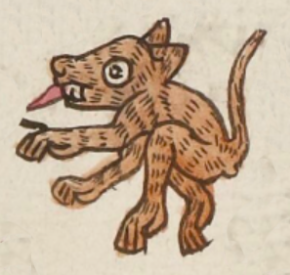tozan (TR46r)
This element of a gopher or mouse (tozan) comes from the compound personal name Mendoza, which features the gopher in combination with a maguey plant (metl). The animal plays a phonetic role in that compound, but here we are isolating it as a logogram. The gopher here is shown in profile, looking toward the viewer's left. Its body is covered in brown, mottled fur. Its legs suggest movement. Its tail is raised, and its coat is textured. White fangs protrude, as does the animal's red tongue. Its tail is raised up, and its white eye is open.
Stephanie Wood
With its unusually long legs, this gopher or mouse does not much resemble the tozan examples from the Matrícula de Huexotzinco (below).
Stephanie Wood
1578
Jeff Haskett-Wood
mice, gophers, ratones, taltuzas, animales, ardillas de la tierra, tuzas, colmillas, lengua saliente

tozan, a gopher or a field mouse, https://nahuatl.wired-humanities.org/content/tozan
la ardilla de la tierra o el ratón
Stephanie Wood
The Codex Telleriano-Remensis is hosted on line by the Bibliothèque nationale de France.
https://gallica.bnf.fr/ark:/12148/btv1b8458267s/f117.item. We have taken this detail shot from folio 46 recto.
This manuscript is not copyright protected, but please cite Gallica, the digital library of the Bibliothèque nationale de France or cite this Visual Lexicon of Aztec Hieroglyphs, ed. Stephanie Wood (Eugene, Ore.: Wired Humanities Projects, 2020–present).






